Lots more electric scooters in Bloomington, but not as many more rides
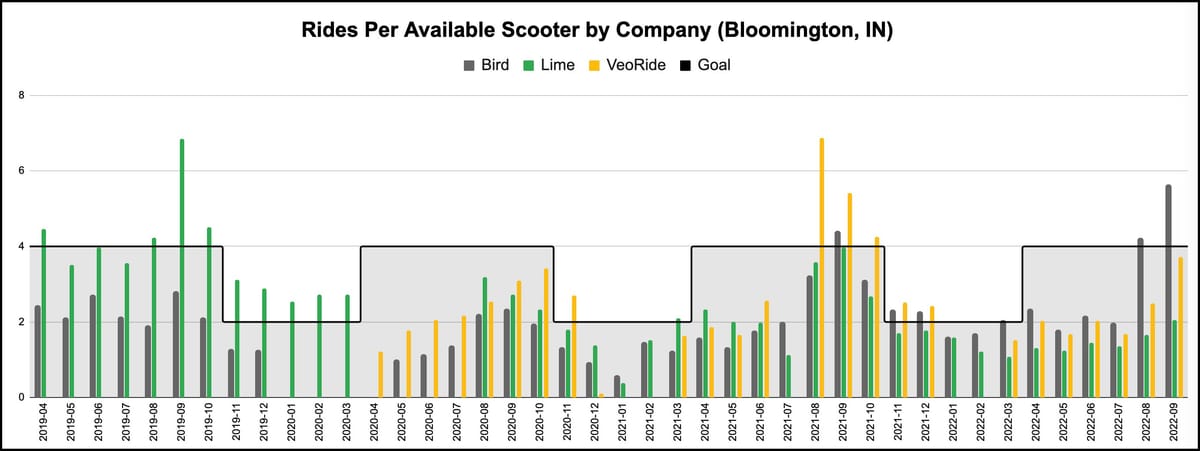
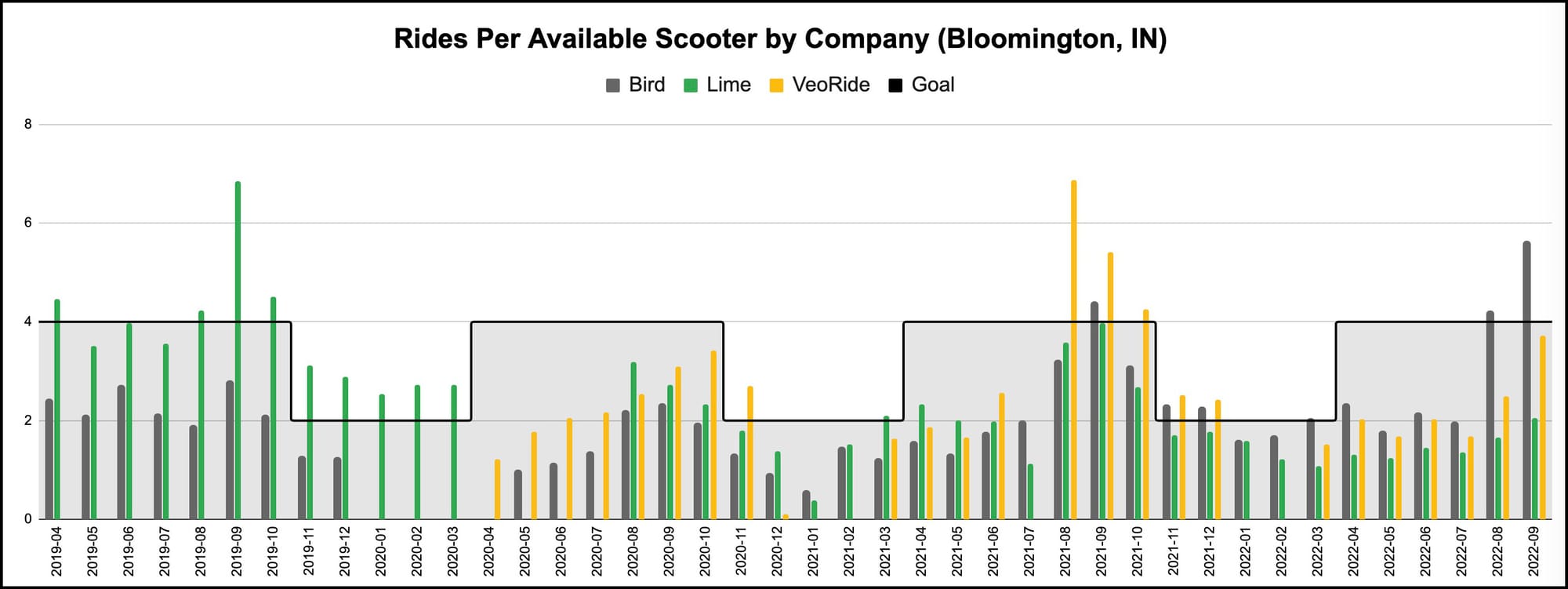
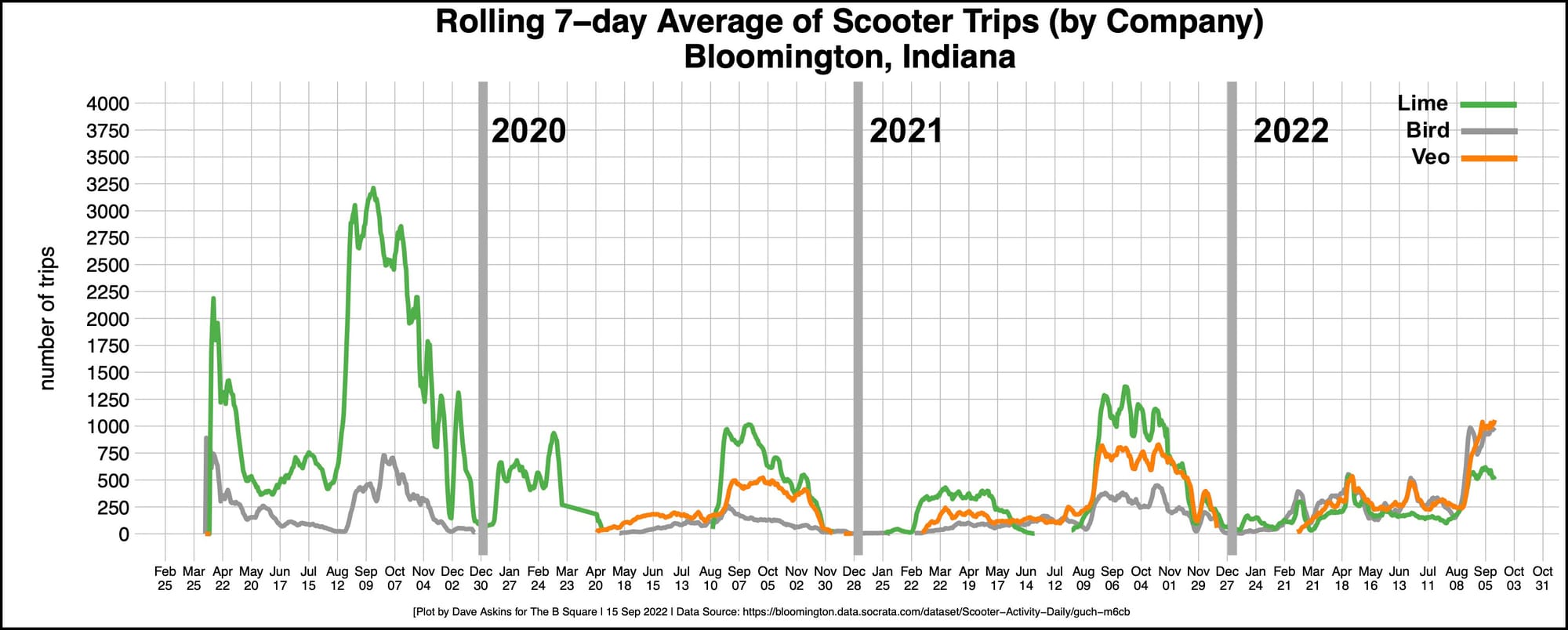
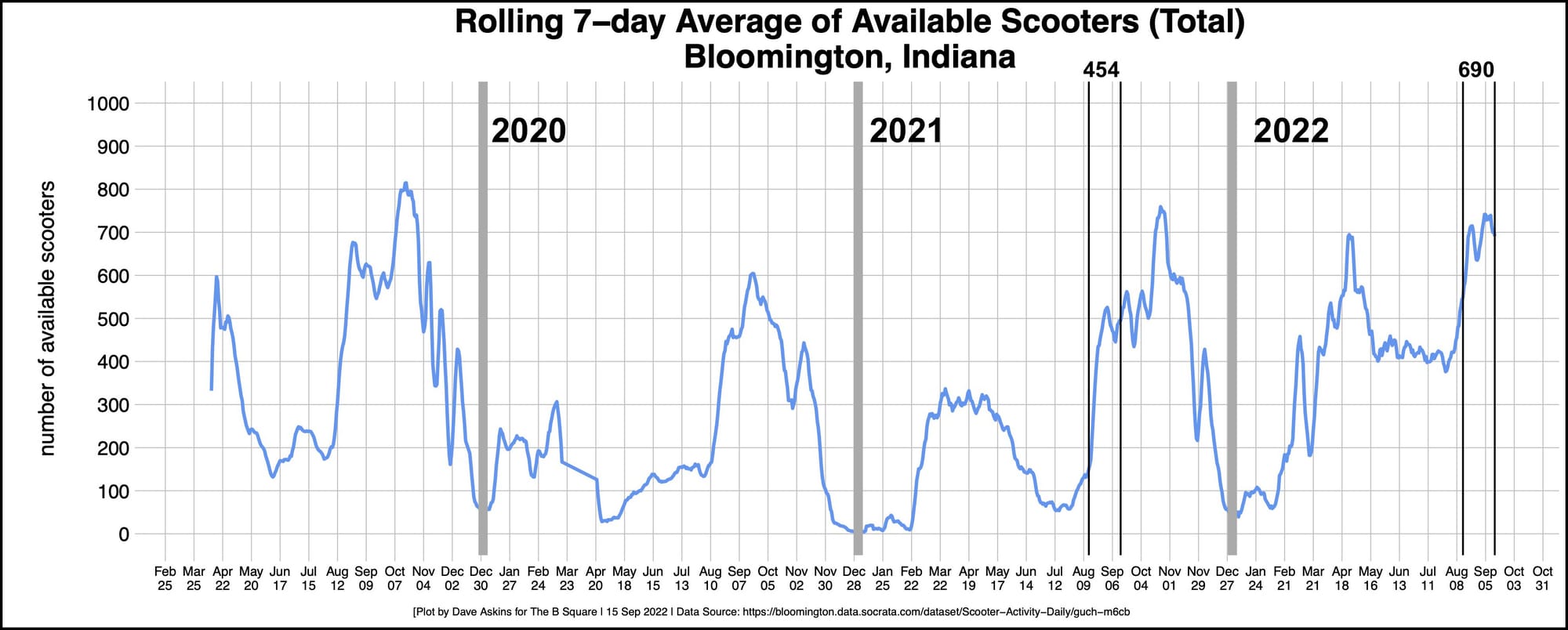
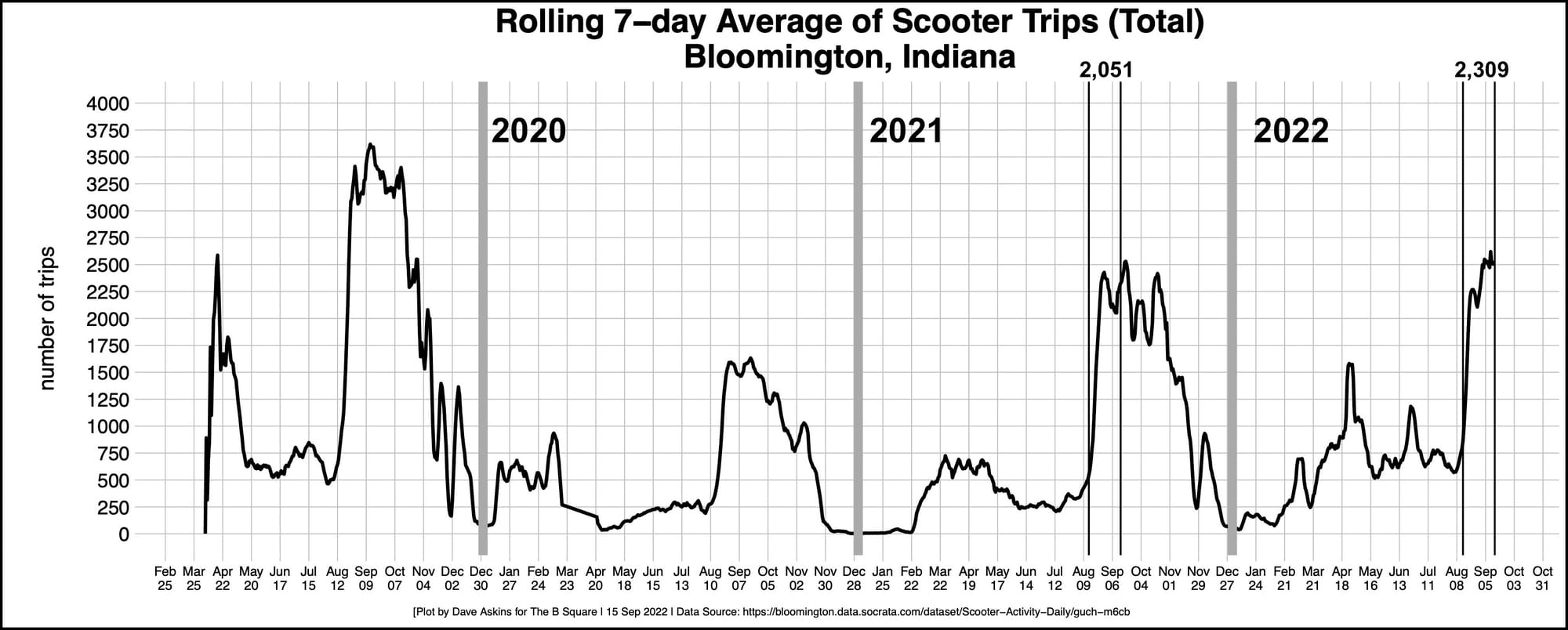
Compared to late summer last year, there are 50 percent more shared electric scooters staged around Bloomington, waiting for prospective riders.
But the 50-percent bigger fleet has generated just 13 percent more rides.
Those numbers are based on the city of Bloomington’s public dataset of scooter activity. Included in the dataset are daily records of the number of rides and the number of available scooters for each of the three scooter companies that are allowed to do business using the public right-of-way.
By the numbers, between Aug. 14 and Sept. 14 of 2021 the total average number of available scooters (counting all three companies) each day was 454, compared to 690 for the same period in 2022. That’s a 50-percent increase.
Between Aug. 14 and Sept. 14 of 2021, the total average number of rides given (counting all three companies) each day was 2,051, compared to 2,309 in 2022. That’s a 13-percent increase.
That means the three companies overall are generating fewer rides per available scooter.
The rides-per-available scooter stat is important, because it’s part of the contractual agreement between each scooter company and the city of Bloomington.
If a company doesn’t hit a minimum number of rides-per-scooter each calendar month, the city is supposed to be able to reduce the allowable number of scooters the company can make available in the public right-of-way.
Based on the city’s dataset, all three scooter companies often fall short of the targets spelled out in the contracts. Those targets are a minimum of 4 rides per scooter per day from April through October and 2 rides per scooter per day at other times of the year.
From April through mid-September this year, only Bird has hit the 4-ride-per-scooter target in any of those months. Those successes came in August and through the first half of September.
Based on the city’s numbers, Bird is achieving almost the same market share as VeoRide, with just 60 percent of the scooters that VeoRide is making available. It’s a remarkable enough feat that The B Square has asked the city’s IT department if there might be a glitch in the data.
In any case, under the terms of the contracts, there are more scooters available overall than there should be, given the number of overall rides.
The stats on rides per available scooter were not a part of an update given on Tuesday to the board of public works by Bloomington director of economic and sustainable development (ESD) Alex Crowley.
About the rides-per-scooter stat, Crowley responded to a B Square emailed question by writing: “We have used our discretion as per the license contract regarding their deployment counts because of the uniqueness of the past several years. As you know, with the pandemic, usage rates and deployment counts have not been anything close to ‘normal.’”
Crowley added, “Absent an unforeseen return of health challenges, I think the 2022–2023 academic year will be a much more representative barometer of the supply/demand of the market. We plan to take a look at rides per deployed scooters after the fall season and again after the spring season before making any recommendations.”
Complaints about scooters blocking sidewalks and ADA ramps were a highlight during departmental budget presentations made to Bloomington’s city council during the last week of August. Scooter complaints were raised as an issue during presentations from more than one department: legal; economic and sustainable development; and public works.
Representatives from those departments are part of a “scooter team” that Crowley mentioned during his Tuesday presentation to the board of public works.
The scooter team will be meeting in early October, Crowley said, to consider revisions to the contracts under which Bird, Lime and VeoRide operate. Crowley indicated that the contract renewals would be considered sometime before the end of the year. The contracts are supposed to be approved by the board of public works.
Currently, scooter companies pay the city of Bloomington $10,000 a year for an annual license, plus 15 cents a ride. Crowley told board of works members he does not think ESD will recommend increasing the licensing fees this year.
Since scooter companies started operating under the city’s 2019 ordinance, approved by the city council at the end of July that year, the city has collected a total of around $225,000, Crowley told the board.
Crowley also updated the board on an effort the city is going to start, to document the parking violations—blocked sidewalks and ADA ramps. Temporary part-time workers will be hired, up to 25 hours a week, to walk around documenting parking issues, and moving scooters that are parked incorrectly to an appropriate place.
Imposing fines is not planned to be a part of this fall’s effort to document scooter parking violations.
The city’s decision not to issue any tickets or fines after more than three years of seeing scooters parked in a way that blocks sidewalks and ADA ramps has been a sore point with residents and councilmembers.
At the July 2019 city council meeting when the scooter ordinance was approved, city attorney Mike Rouker attempted to reassure councilmembers that it would not require a 5-step process to get action from the city to respond to scooter parking violations. Rouker told the council:
So just to be clear, at the same time, that Bird or Lime or another scooter company may be taking those additional steps against their own users, the city, if this is an issue, will be fining them every single time we see a parking issue. So there will be a municipal violation for that illegal parking, which this ordinance permits. And we’ve talked about at length, what those parking, those non-moving violations look like. So there would be parking tickets associated with that. So I suppose if the company wants to move very slowly and pay lots and lots of fines to the city until we’re fed up enough that we either revoke their license or geofence an area, that’s a business decision, but I don’t know if it’s a sound business decision.
Last fall, the B Square published an article highlighting the failure of the city, over the course of two and a half years, to issue any fines for scooter parking violations, despite their frequency. A few weeks later Crowley sent letters to all three companies. [Example of letter sent to Bird]
The December 2021 letter from Crowley took a different approach from Rouker’s vision of a fine-filled future for scooter companies. Crowley wrote: “Penalties may include fines, impounding/removing the scooter(s), and ultimately revoking an operator’s license. The city has not, to date, undertaken any of these actions and, frankly, would prefer to continue to work collaboratively rather than use punitive measures.”
Now another nine months later, Crowley told the board of public works that geofenced corrals could also be a part of the mix. Those are exclusive areas where scooters are allowed to be parked—and a rider would not be able to stop charges from accruing on their ride, until they park their scooter in a legal corral. Geofences have already been implemented by Indiana University on its campus.
Another approach that IU uses to enforce its own campus rules is to impound improperly parked scooters. In a typical month, Crowley said that IU impounds between 60 to 80 scooters. But in August at the start of the school year, they impounded 200, he said.
For IU to impound scooters is probably easier than for the city of Bloomington, Crowley said, “because they have staff out and about, and they have equipment out about” in the normal course of the day. It does not require the university to add staff for that impoundment purpose, Crowley said. He added that impoundment of scooters could certainly be “on the table” for the city to consider.
The best way for Bloomington residents to report scooters that are blocking the sidewalk or ADA ramps is to use the uReport system, director of public works Adam Wason told the board. The uReport system is an online system for logging various kinds of complaints including those about scooter parking.
The current uReport user interface for scooter complaints is more than three years out of date. Among the vendors, the uReport interface does not include VeoRide which started doing business in Bloomington in early 2020. But the user interface does include Pace Bicycles, which withdrew from the market in May 2019.
A month ago, when The B Square alerted the IT department to the uReport interface issue, IT director Rick Dietz replied in an email message: “We can adjust the vendor names without too much trouble.”








Comments ()